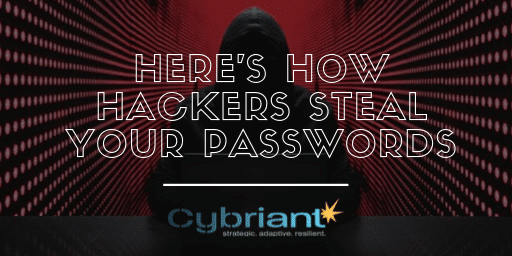Have you ever thought about how hackers manage to steal passwords for financial accounts?
It’s unfortunate that we make it easy for them by using weak passwords that are simple to crack. By exploiting vulnerable account passwords, hackers can access our most sensitive data and use it for illegal activities like identity theft, blackmail, extortion, and more.
The theft of a user’s password can be more damaging than the theft of personally identifiable information (PII) because it gives access to the user’s online accounts. Cybercriminals often use email to deceive users into revealing their passwords and information about other accounts. If an email password is stolen, it can result in more instances of fraud, phishing attacks, data interception, and identity theft., data interception, and identity theft
Here’s how Hackers Steal Your Passwords
According to recent studies on data breach and identity theft, various small to medium-sized businesses (SMBs) still believe that they are saved from hackers stealing user passwords anyway. Many believe their businesses don’t have as much precious data as larger companies and hackers won’t attack them to steal personal data.
There are many other methods of password-stealing methods that hackers use to steal credentials from. If you are wondering how hackers are stealing my password, the following are the ways hackers steal passwords from an individual to an organization of all sizes.
Keylogger:
Another common password-cracking method is to use a keylogger. This is a piece of software that records everything that is typed on the keyboard. The hacker can then use this information to try and guess the victim’s password. There are also many ways to guess passwords, such as using common words or phrases, trying easily guessed numbers (such as 123456), or using publicly available information about the victim (such as their birth date).
Purchase Passwords from Other Hackers:
Hackers can mine stolen credentials and also buy lists of stolen passwords from other hackers via the dark web. These lists often contain millions of passwords, making it very likely that at least some of them will work. Consequently, it is important to choose a strong password, and unique passwords for all of your online accounts.
Using Default Passwords:
Many devices come with default passwords that are easy methods hackers to guess. Hackers can use these common passwords to gain access to devices and then look for ways to steal passwords from the people who use them.
Stealing Passwords from Public Wi-Fi Networks:
If you use a public Wi-Fi network, your password may be intercepted by someone else on the network. This is because the information sent over Wi-Fi networks is not encrypted, so it can be easily accessed by anyone who is on the same network.
Data Breaches:
Data breaches occur when hackers gain unauthorized access to a system, often through an exploit or by exploiting weak security measures. Once they have gained access to the system, they can extract sensitive information such as usernames and passwords. This type of attack is becoming increasingly common, as organizations fail to secure their systems adequately. Consider Managed Services to help your organization protect against data breaches and other cyber threats. Managed Services can help by monitoring for suspicious activity, deploying security patches, and responding quickly to any issues that arise. With the right managed services provider, you can rest assured that your systems are secure against even the most sophisticated attacks.

Using Malware:
Malware is a type of malicious software that is designed to damage or disable computers. Some types of malware can steal passwords by recording what is typed on the keyboard. Other types of malware can take screenshots of what is displayed on the screen, including login details or other sensitive information.
Brute Force Attacks:
During a brute force attack, hackers relentlessly attempt every possible password combination to obtain system access. This method is laborious and time-consuming but can be effective, especially against weak passwords. Hackers use powerful computers to speed up the process, sometimes making millions of attempts per second. In some cases, they might use dictionaries of commonly used passwords or simple variants, thereby increasing the odds of success. This underscores the significance of using strong, complex, and unique passwords that are resistant to brute-force attacks.
Social Engineering:
Social engineering is a type of attack that relies on tricking people into giving away confidential information or their passwords. Hackers will often call or email people pretending to be from a legitimate company, and then ask the person for their login details. They may also try to trick people into using compromised passwords or clicking on malicious links that install malware on their computers.
There are many ways that hackers can get your password. The best way to protect yourself is to choose strong and unique passwords for all of your online accounts and to never reuse passwords across multiple accounts. You should also enable two-factor authentication for your bank account whenever possible. This adds an extra layer of security to your account by requiring you to enter a code that is sent to your phone when you try to log in.
Brute force attack:
A brute force attack is a type of dictionary attack, that tries to guess the password by trying hundreds or even thousands of different combinations. This can be very time-consuming, but if the hacker has access to a powerful computer, they can try millions of different passwords in a very short period. Brute force dictionary attacks are trial and error sessions done various times per minute using a specific program and your private information or words that may be valuable to you.
It’s not all random words special characters or information. Some extra advanced brute force hacking codes and programs use further targeted words that are possible to be used as passwords. These words are prioritized to make strong passwords with a greater possibility of matching.
Spidering:
This password-stealing technique gathers information from company sites or social media websites like Instagram or Twitter to come up with word lists and strong passwords, which are then used to conduct brute force and dictionary attacks on the users.
Rainbow table attacks:
Though it sounds like a board game, this kind of dictionary attack only deals with hashes i.e., the encrypted values of passwords. The rainbow table includes pre-computed hashes of password parts that, when rightly joined, provide the full hash of the target’s real password. While the more professional approach to this attack could produce quicker results, it could also make complex passwords take up a lot of computing power to operate.
Phishing:
Phishing is one of the most common and regularly used password hacks. A hacker will send an email that carries a link that, once clicked, guides to a spoofed website that encourages the person to give their password or other information. In other scenarios, the hacker or malicious link tries to trick the user into downloading a malicious program that skims for the user’s password.
Phishing is a method that hackers use to trick someone into giving away their password. Hackers will often send an email that looks like it’s from a legitimate website or company, asking the user to enter their login details. Once the hacker has this information, they can use it to gain access to the victim’s account.
Social engineering:
According to Hacker’s point of view, if all else fails, use the simplest trick in the book and do it the traditional way. Social engineering is the use of psychological manipulation to gain the trust of an unwitting user. For example, a hacker could drop a harmless thumb drive in an office. Shortly as a victim installs it (normally to obtain information that can help recognize and find its owner), the device will load malware onto the system to steal passwords.

How can I tell if my Facebook account has been hacked?
Hackers have discovered the find my bid.in, password manager, hack to steal social media passwords. You may start receiving notices that a new account has been set up that is identical to yours and is sending out friend requests to your list of contacts. If you get a notification that someone has tried to log in to your account from an unrecognized device or location, this is also a sign that your account has been hacked. To check if your Facebook password has been compromised, you can use the Have I Been Pwned website. This website keeps track of passwords that have been leaked online and will tell you if your password is one of them.
If you think your account has been hacked, you should change your password immediately and enable two-factor authentication. You should also review your friends list to see if any suspicious accounts have been added. If you find any, you should report them to Facebook.
What should I do if my email account has been hacked?
If your email account has been hacked, the first thing you should do is change your password. You should also enable two-factor authentication if it is available. You should then check your email settings to see if anything has been changed, such as the forwarding address. If you find any suspicious activity, you should report it to your email provider.
You should also check your inbox and send messages for any unusual activity. Hackers often use hacked email accounts to send spam or other phishing attacks or emails to the contacts in the hacker access address book. If you find any suspicious emails, you should delete them and report them as spam.
It is also a good idea to run a virus scan on your computer, in case the hacker installed any malware. You should also change the passwords for bank accounts and for any other online accounts with the same default password anyway.
What is Cybersecurity?
Cybersecurity includes the technologies, processes, and practices that are put in place to protect from cyber-attacks that are created to inflict harm against a network system or when hackers gain access to data without authorization.
The most beneficial kinds of IT security for your company will offer a comprehensive solution to protect against a variety of issues. Ideally, your solution needs the following to include: firewall, antivirus, anti-spam, wireless security, and online content filtration.
What is Threat Monitoring?
Threat monitoring includes several different features. Commonly, this service consists of constant monitoring across all networks and vulnerability scanning of access points for any interruptions or signs of malicious activity.
From that point, any monitoring would let the administrator not only determine what is happening across the network at any given moment but also recognize any risks or possible password or breaches of login credential security that are in place. While doing so the administrator could address system vulnerabilities and build a security protocol that will best address these weak points in your system.
Do You Need Security Threat Monitoring?
Apart from some very small exceptions, the answer is clearly YES. Any institution managing any form of intercepted data, financial information, or client is a major target for cybercriminals. Neglecting your network unmonitored is the equivalent of being a sitting duck.
A typical misunderstanding that many small firms have is that their data is not precious to would-be hackers or just not worth their efforts or time. This mindset could make you an easy victim. One of the principal reasons you need cyber threat monitoring is because most cybercriminals take the path of least friction. You need to understand that you are facing the same cyber threats as large companies even though you probably have a fraction of the resources to deal with them.
A single cyberattack can cost you your business. Studies done by the National Cyber Security Alliance revealed that 60 percent of small and mid-sized companies close after 6 months following a cyberattack. Companies that fall victim to hackers and cybercriminals lose their customers’ trust and their clients’ repeat business.
Security Threat Monitoring Benefits
This is why spending on the services of a firm that handles cybersecurity for the company is a must-have investment. Let’s have a look at the reasons why you should partner with a cybersecurity provider like Cybriant right now:
1. Protect Your Business from Cyber Attacks
A cybersecurity provider’s main responsibility is to defend your business from all sorts of cyberattacks. They will deploy security solutions like the Endpoint Protection system to keep malware and hackers away. Their services revolve around actively updating your software and monitoring network activity to meet that end.
2. Identify Weaknesses in your Network Infrastructure
Your network likely harbors security vulnerabilities that will allow hackers to enter your system. When you hire a cybersecurity company, one of the first things they’ll do is examine every nook and cranny of your network for vulnerabilities. They’ll then report their findings to you and generate an action plan to plug these security holes and strengthen your network.
3. Provide Cybersecurity Training
If left inexperienced your employees can be your greatest vulnerability. According to the studies of the Ponemon Institute 2018, human error accounts for 27% of the root causes of data breaches. Cybersecurity training will cut these percentages down as employees learn about correct cybersecurity hygiene and habits.
4. Update Cybersecurity Defenses
Cybersecurity companies will perform regular patch management on every device in the system. Each hardware in the network can house security vulnerabilities in their operating systems. The developers of these programs routinely “patch” these security holes and IT teams download and install these applications on their system devices.
Your cybersecurity partner will install these patches and keep them up-to-date to guard your network from malware that will exploit weaknesses.
5. Detect and Remediate Cybersecurity Issues
A cybersecurity provider will regularly monitor the processes within your system and keep an eye out for inconsistencies. They’ll also implement every method of scanning for malware and viruses within their arsenal to see if more modern forms of malware have sneaked their way into the infrastructure. If their detection programs find anything, they will quickly clean the malware and revive your system to its working condition.
6. Help Your Business with Compliance
As huge data breaches come into mainstream awareness, more and more authorities have started hefting the duty of protecting customer data onto corporations and businesses. They introduce laws to do this and fine entities that don’t comply.
A cybersecurity company will help your business meet these regulations by keeping your network up to date. They will also help you shape policies in your business around cybersecurity so you stay within compliance obligations.
7. Your Crisis Response Team
If unfortunately, a cyberattack happens, your cybersecurity firm will know exactly what to do. For instance, they’ll employ solutions. Should your corporation suffer from an ongoing data breach, they’ll immediately go into action to resolve the situation rapidly to staunch the bleeding.

Improve Password Security
Improving password security is a critical step in bolstering your overall cybersecurity. Start by creating strong and unique passwords for each of your accounts. A strong password typically consists of at least 12 characters and includes a mix of letters, numbers, and special symbols. Avoid using personal information as default passwords such as birthdays or names that could be easily guessed by hackers.
Additionally, implementing two-factor authentication (2FA) provides an extra layer of security. This method requires users to provide two pieces of evidence before gaining access to an account. Lastly, consider using a reputable password manager. These tools generate and store complex passwords for you, significantly reducing the risk of unauthorized access.
Prevent Password Theft with a Password Manager
A Password Manager plays a crucial role in preventing password theft by storing all your passwords securely in an encrypted format. This means that even if a hacker gains access to your computer, they won’t be able to read your passwords. A Password Manager also encourages the use of complex passwords, since you don’t have to remember them, which reduces the likelihood of using easy-to-guess or common passwords.
Additionally, some Password Managers can generate unique, random passwords for each of your accounts, further enhancing your security. Finally, they can auto-fill your passwords on websites, preventing keyloggers from capturing your keystrokes, and ensuring you never have to type out your passwords. These combined measures contribute to significantly stronger passwords, lowering the risk of password theft.
Conclusion
As you can see, a cybersecurity provider can do a lot for your company. The true value of partnering with a cybersecurity company is that it will help your company progress by protecting business continuity and fostering an environment where employees can feel secure to work. A safe working atmosphere plus keeping your reputation clean can guarantee your business’ profit in the long term.



